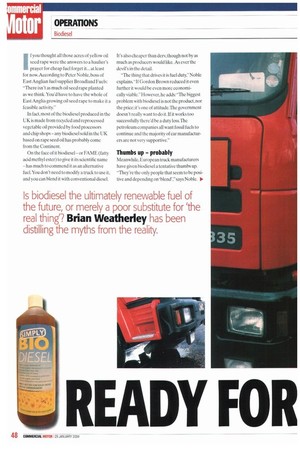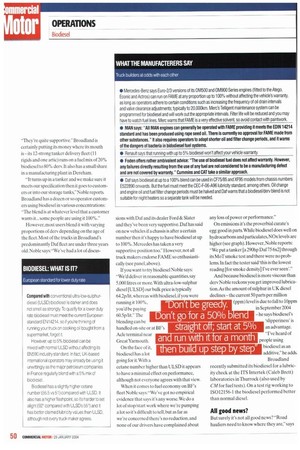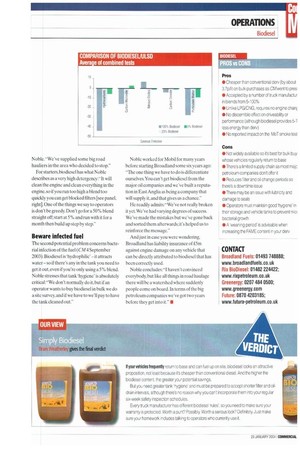I f you thought all those acres of yellow oil seed
Page 48

Page 50

Page 51

If you've noticed an error in this article please click here to report it so we can fix it.
rape were the answers to a haulier's prayer for cheap fuel forget it.., at least for now.According to Peter Noble, boss of East Anglian fuel supplier Broadland Fuels: "There isn't as much oil seed rape planted as we think. You'd have to have the whole of East Anglia growing oil seed rape to make it a feasible activity."
In fact, most of the biodiesel produced in the UK is made from recycled and reprocessed vegetable oil provided by food processors and chip shops-any biodiesel sold in the UK based on rape seed oil has probably come from the Continent.
On the face of it biodiesel -or FAME (fatty acid methyl ester) to give it its scientific name has much to commend it as an alternative fuel.You don't need to modify a truck to use it. and you can blend it with conventional diesel. It's also cheaper than derv. though not by as much as producers would like. As ever the devil's in the detail.
-The thing that drives it is fuel duty," Noble explains." If Gordon Brown reduced it even further it would be even more economically viable." However, he adds: The biggest problem with biodiesel is not the product, nor the price: it's one of attitude.The government doesn't really want to do it. If it works too successfully there'd be a duty loss.The petroleum companies all want fossil fuels to continue and the majority of car manufacturers are not very supportive."
Thumbs up probably Meanwhile, European truck manufacturers have given biodiesel a tentative thumbs up. -They're the only people that seem to be positive and depending on 'blend'." says Noble. "They're quite supportive.Broadland is certainly putting its money where its mouth is —its 12-strong tanker delivery fleet (11 rigids and one artic) runs on a fuel mix of 20% biodiesel to 80% derv. It also has a small share in a manufacturing plant in Dereharn.
"It turns up in a tanker and we make sure it meets our specification then it goes to customers or into our storage tanks," Noble reports. Broadland has a dozen or so operator customers using biodiesel in various concentrations: "The blend is at whatever level that a customer wants it... some people are using it 100%."
However, most users blend it with varying proportions of dery depending on the age of the fleet. Most of the trucks in Broadland's predominantly Daf fleet are under three years old. Noble says:"We've had a lot of discus sions with Daf and its dealer Ford & Slater and they've been very supportive.Daf has said on new vehicles if a chassis is after a certain number then it's happy to have biodiesel at up to 100%. Mercedes has taken a very supportive position too." However, not all truck makers endorse FAME so enthusiastically (see panel. above).
If you want to try biodiesel Noble says: "We'd deliver in reasonable quantities. say 5,000 litres or more, With ultra-low-sulphur diesel [ULSD] our bulk price is typically 64.2p/lit.whereas with biodiesel. if you were running it 100%, you'd be paying 60.5p/lit." The blending can be handled on-site or at BF's Acle terminal near Great Yarmouth.
On the face of it, hiodiesel has a lot going font. With a cetane number higher than ULSD it appears to have a minimal effect on performance, although not everyone agrees with that view.
When it comes to fuel economy on BF's fleet Noble says:"We've got no empirical evidence that says it's any worse, We do a lot of stop/start work where we're pumping a lot so it's difficult to tell, but as far as we're concerned there's no reduction, and none of our drivers have complained about any loss of power or performance."
On emissions it's the proverbial curate's egg: good in parts. While biodiesel does well on hydrocarbons and particulates,NOx levels are higher (see graph). However. Noble reports: "We put a tanker la 290hp Daf 75 6x21through its MoT smoke test and there were no problems. In fact the tester said 'this is the lowest reading [for smoke density] I've ever seen'."
And because biodiesel is more viscous than dery Noble reckons you get improved lubrication. As the amount of sulphur in UK diesel declines— the current 50 parts per million (ppm) level is due to fall to lOppm in September 2004 —he says biodiesel's 'slipperiness' is an advantage. "I've heard of people using biodiesel as an additive." he adds.
Broadland recently submitted its biodiesel for a lubricity check at the ITS Intertek (Caleb Brett) laboratories in Thurrock (also used by CM for fuel tests). On a test rig working to 1S012156-1 the biodiesel performed better than normal diesel.
All good news?
But surely it's not all good news? "Road hauliers need to know where they are," says Noble. "We've supplied some big road hauliers in the area who decided to stop."
For starters, biodiesel has what Noble describes as a very high detergency:" It will clean the engine and clean everything in the engine, so if you run too high a blend too quickly you can get blocked filters [see panel, right]. One of the things we say to operators is don't be greedy. Don't go for a 50% blend straight off: start at 5% and run with it for a month then build up step by step."
Beware infected fuel The second potential problem concerns bacterial infection of the fuel (CM 4 September 2003).Biodiesel is ' hydrophilic' it attracts water-so if there's any in the tank you need to get it out, even if you're only using a 5% blend. Noble stresses that tank 'hygiene' is absolutely critical: "We don't normally do it, but if an operator wants to buy biodiesel in bulk we do a site survey, and if we have to we'll pay to have the tank cleaned out." Noble worked for Mobil for many years before starting Broadland some six years ago: "The one thing we have to do is differentiate ourselves. You can't get biodiesel from the major oil companies and we've built a reputation in East Anglia as being a company that will supply it, and that gives us a chance."
He readily admits:"We've not really broken it yet. We've had varying degrees of success. We've made the mistakes but we've gone back and sorted them afterwards: it's helped us to reinforce the message."
And just in case you were wondering. Broadland has liability insurance of f5m against engine damage on any vehicle that can be directly attributed to biodiesel that has been correctly used.
Noble concludes:"T haven't convinced everybody. but like all things in road haulage there will be a watershed where suddenly people come on board, in terms of the big petroleum companies we've got two years before they get into it.
























































































































































































